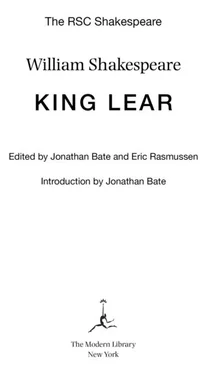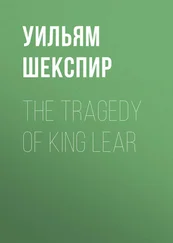уильям шекспир - King Lear
Здесь есть возможность читать онлайн «уильям шекспир - King Lear» весь текст электронной книги совершенно бесплатно (целиком полную версию без сокращений). В некоторых случаях можно слушать аудио, скачать через торрент в формате fb2 и присутствует краткое содержание. Год выпуска: 2011, ISBN: 2011, Издательство: Random House Publishing Group, Жанр: Старинная литература, на английском языке. Описание произведения, (предисловие) а так же отзывы посетителей доступны на портале библиотеки ЛибКат.
- Название:King Lear
- Автор:
- Издательство:Random House Publishing Group
- Жанр:
- Год:2011
- ISBN:978-1-58836-828-7
- Рейтинг книги:3 / 5. Голосов: 1
-
Избранное:Добавить в избранное
- Отзывы:
-
Ваша оценка:
- 60
- 1
- 2
- 3
- 4
- 5
King Lear: краткое содержание, описание и аннотация
Предлагаем к чтению аннотацию, описание, краткое содержание или предисловие (зависит от того, что написал сам автор книги «King Lear»). Если вы не нашли необходимую информацию о книге — напишите в комментариях, мы постараемся отыскать её.
King Lear — читать онлайн бесплатно полную книгу (весь текст) целиком
Ниже представлен текст книги, разбитый по страницам. Система сохранения места последней прочитанной страницы, позволяет с удобством читать онлайн бесплатно книгу «King Lear», без необходимости каждый раз заново искать на чём Вы остановились. Поставьте закладку, и сможете в любой момент перейти на страницу, на которой закончили чтение.
Интервал:
Закладка:
Nunn:As you know, this is not a production that is trying to say “Here we are in the Middle East in the twenty-first century.” But it is hoping that all the things that are part of our experience now will be brought to bear on a contemporary audience watching and receiving the play.
Shakespeare’s play was almost certainly heavily censored when it was first performed. It was probably first performed at court and so it is likely that quite a number of cuts were applied to the text because statements were being made that would not be acceptable to a royal ear, and possibly shouldn’t be heard by anybody. There are a host of things that Lear says about human institutions, “justice”—“which is the justice, which is the thief?”; “authority” as in the police or governmental authority—“a dog’s obeyed in office”—getting its power from name or uniform, but not by standards of behavior. He talks about “politicians”—“Get thee glass eyes, / And like a scurvy politician seem / To see the things thou dost not.” Lear goes through a list of modern and, to our ears, highly recognizable contemporary institutions and says so many of them are corrupt and therefore worthless. But Shakespeare had the perfect reply to the censors. The man saying these terrible things is mad. Who knows, if he had not had that defense, Shakespeare might have done a spell in jail.
Over previous generations the blinding scene has been cut down or merely “suggested,” as something taking place in the dark. Such bowdlerization of Shakespeare is based on the judgment that these things are not for civilized people to watch, or hear. In the twentieth century, believing that Shakespeare should be very much like Samuel Beckett (who was so obviously greatly influenced by the play), the blinding scene became increasingly essential to the play. As we watch, Shakespeare is saying, “Face up to the fact that human beings are capable of unspeakably animal behavior toward each other.” These days, as we read of torture, of the callousness of the suicide bomber who blows up children, we ask how any group of people can say they are justified by any cause whatsoever in doing such things to another group of people? But Shakespeare tells us that it is in us. We humans do it. We do it as a species, and we must face the truth that it’s in human nature to be inhuman.
Academics get very exercised about the variants between the Quarto and Folio texts of the play—the fact that Lear has different dying words in each version, that a different person inherits the gored state at the end of each version (Albany speaks the final lines in Quarto, Edgar in Folio), and so on. Did you concern yourself with these textual matters or do you feel that the director is free to pick and mix, cut and paste, his or her own version of the play?
Noble:I think the director is free to do what he wants to do, but he must also be answerable for what he does. I’ve never been very interested in the textual variations. What I did, particularly in the first production, was skin the last three hundred or four hundred lines—I was absolutely brutal with the cuts there. And the impact of it was that, at the very moment of repentance, it was too late. There was no time to save Lear and Cordelia’s lives, because the people on stage had been chatting, talking all the time. That was all very much to do with the fact that it was a godless universe. The truth is on both occasions I created a world that seemed to me to be logical from all the different versions. I would then be responsible for that and I would stand by that.
Nunn:I don’t think that in 1968 when I first directed the play anybody was yet saying, “The Quarto and the Folio are two quite different plays.” I remember at the time consulting John Barton and arriving at a “best of both worlds” conflated text. That text became the basis of the text I used in 1976 with Donald Sinden, but then when I started out this time with Ian McKellen I did read a number of scholars who were telling me that I should be making a choice between Quarto and Folio. Alas, I found myself unwilling to lose rich and evocative material from either version, and so I worked with a slightly different conflation, but a conflation nonetheless. For me, the more important change since I first directed the play is not in scholarship, but in the simple fact that I am thirty years older now. Shakespeare’s engagement with ultimate questions about mortality, what we construct for ourselves to explain or to accept our mortality, of course speaks more potently to me now. The play, as I have said, is very hard on organized human society and institutions of every kind. There is very little Lear and Gloucester have left to believe in, before they must endure their going hence. Edgar is left to conclude the play, and I think deliberately, it is a conclusion of a man who has nothing really to say. He offers no positive, no beliefs, no journey to a better future. He is by then almost the only character left standing, and in the bleakest of all Shakespeare’s endings, he seems to know that all we can determine on is to “endure.”
SHAKESPEARE’S CAREER
IN THE THEATER
BEGINNINGS
William Shakespeare was an extraordinarily intelligent man who was born and died in an ordinary market town in the English Midlands. He lived an uneventful life in an eventful age. Born in April 1564, he was the eldest son of John Shakespeare, a glove maker who was prominent on the town council until he fell into financial difficulties. Young William was educated at the local grammar in Stratford-upon-Avon, Warwickshire, where he gained a thorough grounding in the Latin language, the art of rhetoric, and classical poetry. He married Ann Hathaway and had three children (Susanna, then the twins Hamnet and Judith) before his twenty-first birthday: an exceptionally young age for the period. We do not know how he supported his family in the mid-1580s.
Like many clever country boys, he moved to the city in order to make his way in the world. Like many creative people, he found a career in the entertainment business. Public playhouses and professional full-time acting companies reliant on the market for their income were born in Shakespeare’s childhood. When he arrived in London as a man, sometime in the late 1580s, a new phenomenon was in the making: the actor who is so successful that he becomes a “star.” The word did not exist in its modern sense, but the pattern is recognizable: audiences went to the theater not so much to see a particular show as to witness the comedian Richard Tarlton or the dramatic actor Edward Alleyn.
Shakespeare was an actor before he was a writer. It appears not to have been long before he realized that he was never going to grow into a great comedian like Tarlton or a great tragedian like Alleyn. Instead, he found a role within his company as the man who patched up old plays, breathing new life, new dramatic twists, into tired repertory pieces. He paid close attention to the work of the university-educated dramatists who were writing history plays and tragedies for the public stage in a style more ambitious, sweeping, and poetically grand than anything that had been seen before. But he may also have noted that what his friend and rival Ben Jonson would call “Marlowe’s mighty line” sometimes faltered in the mode of comedy. Going to university, as Christopher Marlowe did, was all well and good for honing the arts of rhetorical elaboration and classical allusion, but it could lead to a loss of the common touch. To stay close to a large segment of the potential audience for public theater, it was necessary to write for clowns as well as kings and to intersperse the flights of poetry with the humor of the tavern, the privy, and the brothel: Shakespeare was the first to establish himself early in his career as an equal master of tragedy, comedy, and history. He realized that theater could be the medium to make the national past available to a wider audience than the elite who could afford to read large history books: his signature early works include not only the classical tragedy Titus Andronicus but also the sequence of English historical plays on the Wars of the Roses.
Читать дальшеИнтервал:
Закладка:
Похожие книги на «King Lear»
Представляем Вашему вниманию похожие книги на «King Lear» списком для выбора. Мы отобрали схожую по названию и смыслу литературу в надежде предоставить читателям больше вариантов отыскать новые, интересные, ещё непрочитанные произведения.
Обсуждение, отзывы о книге «King Lear» и просто собственные мнения читателей. Оставьте ваши комментарии, напишите, что Вы думаете о произведении, его смысле или главных героях. Укажите что конкретно понравилось, а что нет, и почему Вы так считаете.












